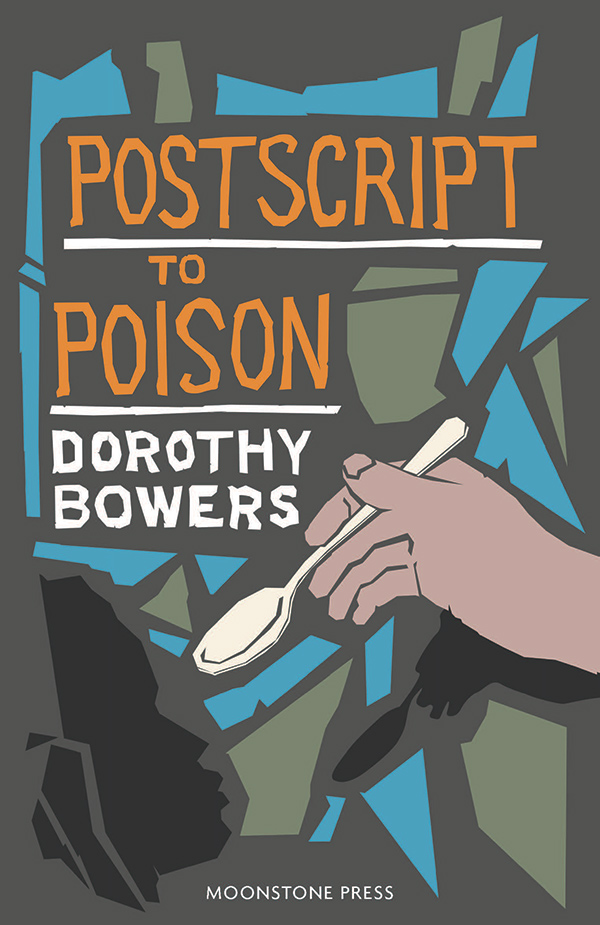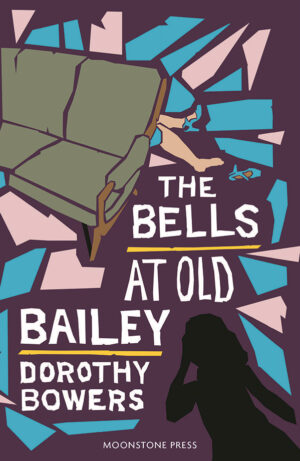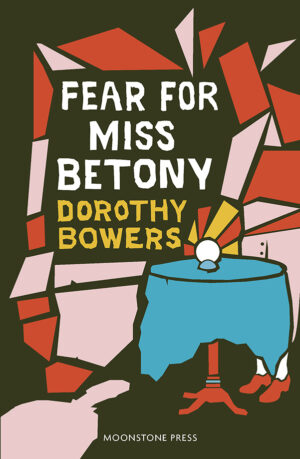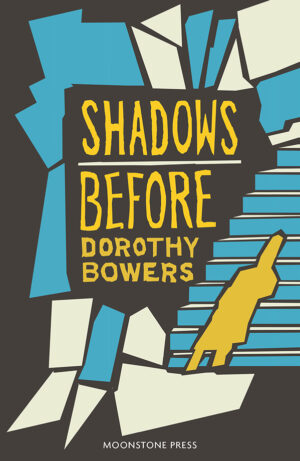Postscript to Poison
“Do you think it’s a secret that you are slowly poisoning Mrs Lackland?”
When Dr Tom Faithful received the third anonymous letter, he knew it was time to call the police. The wealthy Mrs Cornelia Lackland was recovering steadily from a serious illness, diligently cared for by the doctor, family members and her household staff. But something is amiss in Minsterbridge. Mrs Lackland rules her house with an iron fist, keeping granddaughters Jenny and Carol as virtual prisoners and bullying her attendant Emily Bullen. Scornful and dismissive of everyone, she is planning to make one final change to her will. But before she can meet her solicitor Cornelia Lackland is dead, the apparent victim of a poisoner.
As Chief Inspector Dan Pardoe of Scotland Yard and his colleague Sergeant Salt investigate, they find motives for murder much broader than first anticipated. This is a town where everybody’s business is known by everyone else. Pardoe is a satisfying and likeable creation, described by a Sunday Times reviewer as having ‘humanity and common sense as impressive as his intelligence’.
Dorothy Bowers was an advocate of the ‘fair play’ school of detective novels, and displayed great ingenuity in piecing together the necessary elements of a baffling mystery, with clues shared freely with the reader. When Inspector Pardoe indicates he knows who the murderer is, the reader knows virtually everything he does. Bower’s great skill is in obscuring her characters’ motives, while writing perceptively about their feelings and situation, which allows her to hide the identity of the murderer until exactly the right moment.
£9.99
By Dorothy Bowers
First published in 1938 by Hodder & Stoughton
252pp
ISBN 9781899000081
252pp
Table of Contents
Introduction
I — and Tomorrow
II Twilight of a Goddess
III The Late Mrs. Lackland
IV Question and Answer
V The Last Dose
VI Poison and Penmanship
VII Mr. Rennie Recalls —
VIII I, John Lackland
IX Starshine in Chelsea
X Shadow over Lacklands
XI The Case against X
XII Upstairs and Down
XIII Appearance and Disappearance
XIV Postscript
XV Hetty
XVI Three Visits
XVII A Murderer Strikes Again
XVIII True Bill
2 reviews for Postscript to Poison
Only logged in customers who have purchased this product may leave a review.
Dr. Tom Faithful closed the door quietly and came downstairs with characteristically light tread. Well-controlled muscles lent to his movements a grace oddly at variance with his bulk. The hall was empty, still as the summer afternoon outside that sent a shaft of sunlight through the transom of the front door. From the servants’ quarters came now and again tones he recognised for those of Hennessy, the butler, and from not far away the sound of somebody washing a car.
For a moment the doctor hesitated, then went purposefully towards a room on the left. Through the closed door came a murmur of voices, cut once by an impatient laugh which seemed suddenly caught back as Dr. Faithful, rapping perfunctorily, turned the knob and came in.
It was a small room he entered, high-ceilinged, its pleasant proportions rather sparely furnished in excellent taste. A girl who had been standing by the front window running the silk tassel of the blind cord through her fingers almost spun round, lips parted like a runner’s, her eyes suddenly bright and concentrated, till seeing it was the doctor she composed herself and gave him a cool little smile.
“Well, Doc, and what is dear Grandmama’s last decision?”
The doctor smiled good-naturedly. It was hard to do otherwise at the charming little blonde who confronted him, her hair beautifully coiffured in a style that gave piquancy to the half-shrewd, half-childish eagerness of her face. The sleeveless frock she wore, of extreme simplicity and vaguely suggestive of longer wear than its owner might care to remember, made all the brighter her challenging personality.
“So you think your grandmother’s routed me, eh, Carol?” His voice like his step was easy and attractive. “Not a bit of it. But isn’t Jenny here?”
“Yes,” came a lazy voice from a deep chair beside a window facing the door. The chair grumbled a bit on its castors, and an untidy newspaper that had effectively screened its occupant was dropped. The girl called Jenny, dark, slim, deeply tanned, in a white-collared blue frock that set off her skin, got slowly to her feet and met the doctor’s glance hopefully.
“What’s that?” she asked. “You mean you’re not letting Gran have her own way? You don’t think she’s well enough?”
“On the contrary. Mrs. Lackland, in spite of the disappointment she gave me on Saturday, is a highly satisfactory patient.”
“But you said—” began Carol with unnecessary violence.
“What?” asked Faithful sharply. Hands in pockets he strolled to the fireplace, turned his back on it, and looked from one girl to the other with a faint lift of his brows.
“That she hadn’t got what she wanted,” Carol finished more quietly.
“I did not. You implied she’d got it in face of my opposition. She hasn’t, because I’m in entire agreement with her. There’s no reason whatever why your grandmother shouldn’t come down tomorrow, and none at all against her seeing Rennie. In fact, the state she’ll be in if she doesn’t is likely to produce more harm than any interview with a lawyer can do.”
“Traitor,” said Carol briefly. Jenny began arranging the disordered paper without a glance for either.
“Don’t be ridiculous, child,” Faithful replied unhurriedly. “I’m not likely to insist upon Mrs. Lackland’s stopping in bed and seeing nobody just because life’s a bit more comfortable for you when she’s upstairs. Now am I?”
“I think you might,” said Carol shamelessly. “Anyhow, you could express yourself less brutally.” For all the flippancy of her reply some agitation, hardly suppressed, seemed rising within her, but before she could say any more Jenny remarked calmly: “But you don’t know, Doctor, that the interview with her lawyer won’t excite her.”
Faithful looked at her quickly, but before he could answer, Carol, eager to endorse the last statement, struck in with: “No, of course not. It all depends on what she wants him for, and for days now she’s been all worked up at the thought of having him here.”
The doctor made a brusque gesture.
“Then the best treatment for her nerves is his visit.”
He turned abruptly to Jenny, who was gazing out of the side window against which a laburnum, its flowers withered long ago, hung soft sprays of leaves.
“Have you any reason for supposing that Mrs. Lackland’s business with her lawyer will be upsetting?”
Jenny shrugged. “Plenty. But so would you if you were one of us. But, oh, what’s the use—” She broke off and, sensing the doctor’s impatience, adopted a mood of acquiescence which cleared the air.
“She’d like me to make an appointment then for tomorrow afternoon, I suppose?” she asked quietly.
“Probably. But I fancy by Mrs. Lackland’s remarks that she’d already arranged the interview with Rennie, and that he’s simply waiting for a medical verdict to confirm it. Well, that’s how it stands,” he added. “I was bound to tell her that I was pleased with her at last, and that there could be no real objection to an occasional visitor or two provided she knows when to part with them and goes on observing early-to-bed. Apart from the surprising sickness last weekend which seems to have been due to her disregard of the diet I’ve emphatically insisted upon, Mrs. Lackland has made astonishing progress in the last month, and though she had to be sent back to bed the other day it isn’t necessary to keep her there now.”
“No. Well,” sighed Carol, perching herself with delicate caution upon a small table by the window and swinging one leg in dreamy fashion, “it’s simply the old case of devil and deep sea. Keep Gran upstairs and increase her wrath. Let her come down and increase ours.”
“Not exactly,” observed Jenny curtly. “It’s just as irritating whether she’s in bed or out of it.”
“That’s out of my sphere,” said Faithful thankfully. “All I can answer for is Mrs. Lackland’s bodily improvement. If she pays reasonable attention to what she eats and when, it’s unlikely she’ll have a recurrence of last week’s trouble. Miss Bullen too, who sees her more constantly perhaps than anybody else, says her spirits have picked up wonderfully in the past few days.”
“Naturally,” said Carol quickly, “‘malice aforethought.’ Grannie’s, I mean, not Emily’s—this time!” Then as the doctor looked steadily at her she added: “Oh you needn’t make eyes at me like that! She’s feeling vile to Jenny because of her young man, and that’s what made her spirits go up with a bang and why she wants to talk to Rennie, I expect!”
Jenny coloured and made as if to speak, but Faithful had turned to Carol.
“And who, pray, is Jenny’s young man? The film star?”
“Yes. Carnowski. It’s been a heavenly thrill, but Grandma found out everything.”
“With Emily’s help,” added Jenny, with finality. The colour burned brightly through the brown of her cheeks. She looked suddenly taut.
“Having revealed so much,” said Carol lightly, “you’d better learn our deadly secret. Emily goes out tonight—to disport herself, we’re pretty sure, at the pictures, where Jan Carnowski ‘Continues to Draw Great Houses to Black Arches, the Super Film of Our Age,’” she giggled, “and Jan himself steps out of the picture and has supper here with Jenny! Now would you call that dramatic irony?”
“I’d say it was an unnecessary piece of melodrama,” the doctor retorted grimly. “Isn’t that mere unwise bravado?” He turned to Jenny.
“No, not really. Jan would much rather take me out somewhere, but I’ve got to spend my evenings in while Gran’s in her room because from teatime onwards she’s apt to want me at any moment.”
“And it’s hell,” Carol added simply, “if you’re not there.”
“I see.” The doctor’s comment was brief, his expression merely professional. He turned to go. “I’ll drop in by the end of the week,” he said briskly, “to make my farewells. The locum comes in on Monday.”
“Scotland, isn’t it?” inquired Jenny, rather indifferently. “How long did you say?”
“A fortnight. Sure to go fast, but mountain streams and a spot of fishing will be a blessed oasis in this heat.”
As he moved away his eye was caught by the whiteness of Carol’s cheeks. She was twisting into little tubes the dropped petals of some large pink roses on the table.
“You look as if a tonic mightn’t come amiss, Carol. Like me to shake you up something?”
The girl shook her head sharply.
“It’s this grilling weather,” she said, shortly. “The sort we always get in Minsterbridge when the sun shines for more than a week. I’m all right really.”
As if to emphasize her vigour she ran swiftly the yard or so to the door and swept it wide open before the doctor could do so.
“Oh, miss,” a small chubby maid standing very close to it gasped and swayed forward a little. Faithful, with an amused glance at her distress, went out into the hall and took his hat.
He heard Carol’s angry “Hetty!” and the beginning of over-hasty assurances from the culprit, then lingering no further directed a wordless goodbye of raised eyebrows to Jenny in the background and let himself out.
On the short flight of steps, flanked by little brick pillars at the bottom, Dr. Faithful stood for some seconds looking thoughtfully down the familiar sun-baked path to the severe iron gate set in the wall on the road. In the mature warmth of the July day, the tea hour approaching, house and road and even the jaded grass of the lawn had the somnolent charm of a sleeping cat. Despite the strain visible in his face it was with satisfaction that the doctor surveyed the scene and looked back reflectively to the end of an exhausting piece of work. When he came down the short path and out into the square where the light lay shadowless on ripe old brick, and plane trees, formally spaced, stood breathless in the quivering heat, the tantalizing vision of his Scottish burn and the folding mists above it seemed a mirage unlikely to assume reality, so wide a gulf lay between this world and that.





Editor –
Review from The Observer, August 21, 1938 by Maurice Richardson:
“Miss Bowers is new this term. Let me be the first member of the staff to extend her a hearty welcome. She has been coached in our traditions, and is likely to settle down quickly. “Postscript to Poison” is a thoroughly satisfying piece of family narcotising — in the old horror’s medicine just before she was going to change her will. Good characters including frustrated wards, one of whom lets a film actor in by the garden gate, and the local doctor, who suffers from attacks by a poison pen. A double bluff by Miss Bowers effectively conceals who did it. This pupil has little to learn, and should go far.”
Editor –
Review from The Times (London) September 6, 1938:
“The author shows herself considerably adept not only in contriving a plot to puzzle readers, but in characterization and command of situation. She recounts a domestic poisoner mystery in which the two spte-grandchildren of the murdered woman, the local doctor, and an anonymous letter writer play important parts. Miss Dorothy Bowers, i her succeeding books maintain the level of her first, should make a name in detective fiction.”